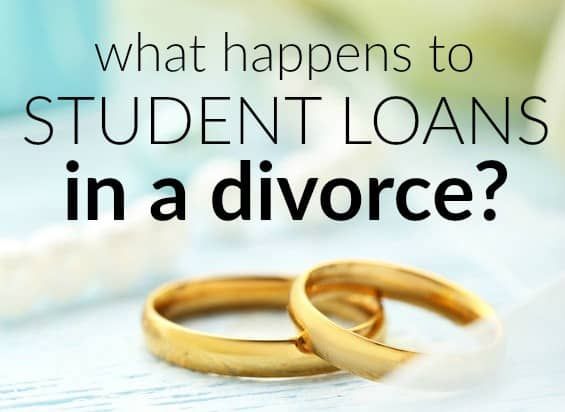
What happens to student loans in a divorce? It’s hard to imagine getting divorced when you’re that you're young and getting student loans - and harder to imagine it happening before you pay off your student loans. Could life after college be so cruel?
But like it or not, plenty of people get divorced every year while still paying back student loans. It’s an ugly reality that can lead to even uglier conflict when neither side is clear on the legalese of the situation. It’s important for anyone in this situation to bone up on just how it all works.
It can get tricky, so listen closely - here's what happens to student loans in a divorce.
Rule: The Name On The Loan Is What Matters
The bottom line with student loan debt is: the name on the student loan is the one that matters.
Even if your ex agrees to help pay off your student loans, you need to double check that they’re making payments. Whoever has their name attached to the loan is the one who will suffer if any payments are missed. That usually means a drop in credit score.
“Let’s say you agree to some arrangement and it’s part of your divorce decree,” Accredited Investment Fiduciary Charles C. Scott said. “That’s great, but the lender doesn’t have to abide by it. You signed the loan contract so you are the one they expect the payment from - and the one they will go after if payments are late or missed altogether. It will be your credit that is impacted by this.”
There are a few general debt rules that apply to most people regardless of where they live. Any debt incurred before you got married remains your debt, unless you consolidated or refinanced with your spouse during your marriage. If both your names are on the loans, things become a bit more complicated.
Some couples refinance or consolidate their separate student loans into one during their marriage. Scott said he recommends splitting those loans up so each person is responsible for their individual loan. But with spousal consolidation loans, it's not always that easy.
“In most states, the divorcing parties can do this any way they want as long as they both agree to it,” he said.
There are some cases where both partners can become liable for student debt incurred during a marriage, even if only one person’s name is on the loan. That depends on what the judge decrees or what both parties agree to in the settlement.
Local laws vary wildly and can determine if you’re on the hook for your spouse’s student loans or not. Some of this depends on if the debt led to a larger income, enabling both parties to enjoy a higher standard of living.
Typical Scenario: Federal Student Loans
When you have Federal loans, they typically are in your name, and always stay in your name. You are always responsible for your loans.
If you get a divorce and are struggling to pay your student loans, switching to an income-based repayment plan may make sense. Here's the caveat: when you apply for income-based repayment, the Department of Education will use your Adjusted Gross Income from your tax return, unless you opt for alternative income documentation. Since the year prior to your divorce you typically filed your taxes jointly, it could artificially inflate the amount of your student loan payment.
Another less typical scenario involves spousal consolidation. Spousal consolidation was available to borrowers in the lat 1990s and early 2000s, before Congress banned it. Some people still have spousal consolidation loans, which, like they sound, means that two spouses combined their loans. These loans are incredibly tough to deal with, because they don't qualify for income based repayment plans or allow consolidation in most cases. The best scenario here is likely to refinance into two separate private loans for each spouse.
Update: Starting in late-2024, there will be a process that the Department of Education will announce to separate these spousal consolidation loans.
Typical Scenario: Private Student Loans
Private student loans are usually a bit trickier. The reason? The large majority of private loans require a cosigner. For married couples, that cosigner is typically the spouse.
So, going back to the rule we discussed above, it's the name on the loan that matters, since the spouse cosigned, both names are on the loan and both parties are impacted. Some private student loans offer cosigner release, which could be a smart move in divorce. Otherwise, refinancing into a loan without a cosigner will likely be required, but could be tough to do.
If you're needing a loan to refinance, we recommend Credible to compare the various loan options available. College Investor readers get a special bonus of up to $1,000 when they refinance with Credible! Several lenders on the platform will work with couples splitting loans.
What To Keep In Mind
Couples who have diverging salaries may struggle to pay off their student loans by themselves. If you’re worried about paying your bills after a divorce, decrease your payment plan or file for deferment.
Federal loans have many income-based options that can lower your monthly payments. Each private lender has their own repayment plans, but it never hurts to ask what your options are. This is especially true if you find your income bracket changing dramatically after the divorce.
The cold reality of student loan repayment may seem harsh when going through a divorce, but try not to let that keep you from making payments on time. Remember, lenders are more willing to work with you while you’re still making payments than when you’ve already missed a few.
Consult a lawyer if you aren’t sure what to do about student loans after divorce. They’ll be able to provide more specific advice and suggestions on on the legal side of things. Likewise, a financial planner can help you suss out the financial details.
If you're not quite sure where to start or what to do, consider hiring a CFA to help you with your student loans. We recommend The Student Loan Planner to help you put together a solid financial plan for your student loan debt. Check out The Student Loan Planner here.

Zina Kumok is a freelance writer specializing in personal finance. She has been featured in Lifehacker, DailyWorth and Time, and she paid off $28,000 worth of student loans in three years. She also works with people one-on-one as a money coach at ConsciousCoins.com.
Editor: Robert Farrington Reviewed by: Chris Muller
